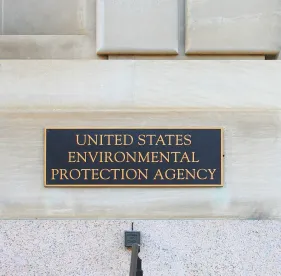On Thursday, March 26, 2020, the United States Environmental Protection Agency (U.S. EPA) announced an Enforcement Discretion Policy for the COVID-19 Pandemic. Being mindful of the health and safety of the public, as well as U.S. EPA staff, and the staff of other federal, state, and local agencies, contractors and nongovernmental organizations during the COVID-19 pandemic, the U.S. EPA announced a temporary policy regarding U.S. EPA enforcement of environmental legal obligations during the COVID-19 pandemic.
The U.S. EPA’s temporary enforcement discretion policy applies to civil violations (not criminal violations) during the duration of the COVID-19 pandemic. The policy addresses different categories of noncompliance differently, as addressed below. The temporary policy makes it clear that all entities should make every effort to comply with their environmental compliance obligations. However, in the event that compliance is not reasonably practicable, facilities with environmental compliance obligations should act responsibly in order to minimize any effects and the duration of any noncompliance caused by COVID-19. In order to be eligible for enforcement discretion, facilities are required to document decisions and actions made to prevent or mitigate noncompliance and return to compliance as soon as possible, and must also identify how the noncompliance was caused directly by the COVID-19 pandemic.
Applicability
The U.S. EPA’s temporary policy applies retroactively beginning on March 13, 2020, and will apply to actions or omissions that occur while the policy is in effect, even after the policy terminates. The U.S. EPA will assess the continued need for and scope of this temporary policy regularly, and will provide updates if and when modifications are necessary. The U.S. EPA will also post a notification here at least seven (7) days prior to the termination of this temporary policy.
While the temporary enforcement discretion policy is in effect, the U.S. EPA’s self-disclosure program remains available. Information about the U.S. EPA’s violation disclosure policies, including conditions for eligibility, can be found here.
This policy does not apply to imports. The U.S. EPA is especially concerned about pesticide products entering the United States, or produced, manufactured, and/or distributed in the United States, that claim to address COVID-19. Information relating to Federal Insecticide, Fungicide, and Rodenticide Act (FIFRA) import requirements can be found here.
Routine Compliance Monitoring and Reporting
In general, the U.S. EPA does not expect to seek penalties for violations of routine compliance monitoring, integrity testing, sampling, laboratory analysis, training, and reporting or certification obligations in situations where the U.S. EPA agrees that COVID-19 was the cause of the noncompliance and the entity provides supporting documentation to the USEPA upon request.
After this policy is no longer in effect, the U.S. EPA expects full compliance going forward. In general, absent exigent circumstances, the U.S. EPA does not plan to ask facilities to “catch-up” with missed monitoring or reporting if the underlying requirement applies to intervals of less than three months. When this policy is no longer in effect, the U.S. EPA expects facilities to take reasonable measures to resume compliance activities as soon as possible, including conducting late monitoring or submitting late reports.
If a submission to the U.S. EPA requires a “wet” signature of a responsible official, the U.S. EPA will accept a digital or other electronic signature. The mere inability to obtain a “wet” signature will not be considered a justification for failure to make a paper submission or certification.
Settlement Agreement and Consent Decree Reporting Obligations and Milestones
If, as a result of COVID-19, parties to U.S. EPA administrative settlement agreements anticipate missing enforceable milestones set forth in those documents, parties should utilize the notice procedures set forth in the agreement, including notification of a force majeure, as applicable.
With respect to consent decrees entered into with the U.S. EPA and the U.S. Department of Justice (DOJ), these documents are agreements and court orders. U.S. EPA staff will coordinate with DOJ to exercise enforcement discretion with regard to stipulated penalties for routine compliance obligations and will also consult with any co-plaintiffs to seek agreement to this approach. Courts retain jurisdiction over consent decrees and may exercise their own authority. Parties should utilize the notice procedures set forth in the consent decree, including notification of a force majeure, as applicable, with respect to any noncompliance alleged to be caused by COVID-19.
Parties should proceed as proposed in their notice to the U.S. EPA (and to DOJ for consent decrees) unless and until contacted by the agency (if a U.S. EPA administrative settlement) or DOJ (if a judicial consent decree).
Facility Operations
It is the expectation of the U.S. EPA that all regulated entities will continue to manage and operate their facilities in a manner that is safe and that protects the public and the environment. Facilities should contact the appropriate implementing authority (U.S. EPA region, authorized state, or tribe) if facility operations impacted by the COVID-19 pandemic may create an acute risk or an imminent threat to human health or the environment.
If a facility suffers from failure of air emission control or wastewater or waste treatment systems or other facility equipment that may result in exceedances of enforceable limitations on emissions to air or discharges to water, or land disposal, or other unauthorized releases, the facility should notify the implementing authority (U.S. EPA regional office or authorized state or tribe) as quickly as possible. The notification also should include information on the pollutants emitted, discharged, discarded or released; the comparison between the expected emissions or discharges, disposal or release and any applicable limitation(s); and the expected duration and timing of the exceedance(s) or releases.
If a facility is a generator of hazardous waste and, due to disruptions caused by the COVID-19 pandemic, is unable to transfer the waste off-site within the time periods required under Resource Conservation and Recovery Act to maintain its generator status, the facility should continue to properly label and store such waste. If these steps are met, as an exercise of enforcement discretion, the U.S. EPA will treat such entities as hazardous waste generators, and not treatment, storage and disposal facilities. In addition, as an exercise of enforcement discretion, the U.S. EPA will treat Very Small Quantity Generators and Small Quantity Generators as retaining that status, even if the amount of hazardous waste stored on-site exceeds a regulatory volume threshold due to the generator’s inability to arrange for shipping of hazardous waste off of the generator’s site due to the COVID-19 pandemic.
Superfund and RCRA Corrective Action
This temporary policy does not apply to activities that are carried out under Superfund and RCRA Corrective Action enforcement instruments. We can expect that the U.S. EPA will address these matters in separate communications.




 />i
/>i
